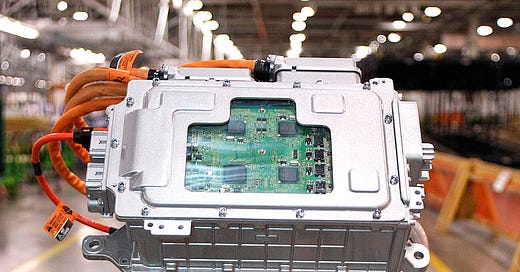
Picture a global market worth trillions of dollars—one roughly the size of Indonesia or Saudi Arabia. Now imagine a hundred thousand workers whose jobs and livelihoods hinge on whether the United States wins this market and sparks a renewal of American manufacturing. As we transition to electric vehicles, this isn’t just a possibility—it’s a concrete, highly lucrative opportunity.
We are not chasing nostalgia here. The days when you could fill a factory in Youngstown with 20,000 autoworkers are long gone, with manufacturing itself redefined by automation and cheaper sourcing. I know it, and workers across the country know it. But the trillion-dollar EV market is up for grabs and represents an opportunity to give American workers a win.
The global EV market has already doubled in size between 2020 and 2021, and it won’t slow down any time soon. EV manufacturing can bring hundreds of thousands of jobs to industrial areas across the Great Lakes region—places where we saw not just the devastation and betrayal that came with factories shutting down, but also resilience.
That resilience is here, in places like Ohio, where the possibilities of huge economic transformations can be the most compelling. The people I see want politicians, the media, indeed everyone, to stop looking backward—to stop talking about the petty disputes and look ahead, collectively, at where we’re going as a nation.
We don’t want to watch from the sidelines anymore. Americans are hungry for a new, exciting vision for the country. Our communities can be part of a new, vibrant industrial era, powered by clean energy technologies like the EV industry. This is a future that Americans can rally around.
New, complicated technologies like EVs can take years to develop into a mature industry. That’s why the suite of laws signed by President Biden are vital to set the stage for the next era of American automotive dominance. Companies are deciding now whether to retool a factory, where to anchor new plants, and how to build out supply chains. So America set ambitious targets that are driving domestic raw material sourcing, expanding charging infrastructure and scaling up battery cell and EV manufacturing.
We don’t want a participation trophy—we want to win. Tax credits and manufacturing grants in the Inflation Reduction Act, the Bipartisan Infrastructure Law, and the CHIPS and Science Act are giving communities in the Great Lakes the standing to win against global competitors like China as the entire automotive industry transitions to EV manufacturing.
The impact of these federal investments is clear. We expect the domestic EV market to jump by 50 percent through 2030—that means 680,000 stable, good-paying American jobs by the end of the decade. It can turn these forgotten areas into comeback communities.
Take GM and LG Energy Solution’s joint venture for the Ultium Cells battery manufacturing plant: it’s already creating a couple of thousand union jobs in my old congressional district. We’re seeing labor leaders in Ohio working to make sure that the workers building America’s new competitive advantage receive their fair share. Indeed, the United Auto Workers (UAW), under new leadership, is already pushing to bring wages more in line with the auto industry standard.
I’m encouraged that wages and benefits will continue to go up. Why? Because scrappy American workers, when empowered to exercise their freedom to organize under the law, will fight like hell to help America win this competition. They understand their lives and families hang in the balance, so they are ready to work hard and pour their sweat into a challenge that gives them purpose and pride.
I truly believe that unions are key to how we win this trillion-dollar market. They’re about as American as it gets, showing us how much we can achieve with freedom, hard work, and unity around a common purpose. Union favorability is at an all-time high as President Biden, the most pro-union president of our lifetime, continues to wave the flag for workers’ rights. Even corporate leaders like Mary Barra, GM’s CEO, have encouraged workers to join the UAW. When organized around freedom, a big competition, and a chance to prosper, American workers are an unstoppable force.
We’ve seen this work before. Landing an American on the moon demonstrated the power of unity and a shared vision around an ambitious goal. Now we need to use that same vision to make big things like electrifying our transportation sector or moving the needle on permitting reform happen. It’s about using our freedom for a higher purpose that enhances our shared economic and political liberty.
We’ve got to move away from the culture war catnip that divides us and start to focus on the real competition. Today, the Chinese government maintains a vice-like grip on the raw materials and components needed for EV batteries and now boasts record sales. China is not just any player when it comes to the EV market, it's the biggest. They see EVs as an opportunity—and so should we.
This is the race we’re in today, with the prize of a $1 trillion annual global market in the next thirty years. And if we get it right, American companies and workers can both win big.
Tim Ryan is a Senior Visiting Fellow at Third Way and formerly represented Ohio’s 13th Congressional district in the United States House of Representatives.




